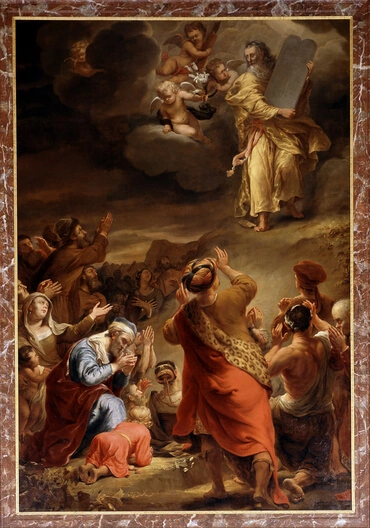Scriptural Confirmations #51
51. 23. (This city [Jerusalem] shall be devastated so that there is no inhabitant (Jer. 26:9). This city shall become a devastation (Jeremiah 27:17).)
That great day there is none like it, a time of trouble (Jeremiah 30:7).
Behold the tempest of the anger of Jehovah shall go forth, a tempest rushing upon the head of the impious. In the latter days ye shall understand it (Jeremiah 30:23-24).
(Jerusalem and the cities of Judah are a desolation, nor is there an inhabitant in them (Jeremiah 44:2, 6, 22).)
(Because of the day that cometh to lay waste all the Philistines (Jeremiah 47:4). Throughout the chapter the vastation of the Philistines is treated of, who are those that are in some understanding of truth but not in the will of good, whence there is profanation of the truth by falsities, as with those who are in faith alone.)
(Of the vastation of those who adulterate the goods of the Word and the church, who are described by Moab: of their vastation the whole chapter treats (Jeremiah 48). And there vastation, desolation and visitation are mentioned (verses 1, 3, 8-9, 15, 20, 32, 34), visitation (verse 44). Again, of the desolation of those who adulterate the truths of the church; who is the man of Edom (49:7-22). Vastation and desolation are named (49:10, 13, 17, 20). Moreover, of those who falsify truths, who are the sons of Ammon, Damascus and Elam (Jeremiah 49, particularly verses 2-3 seq.).
Of those who vastate the church by the love of self and the love of dominion, who are Babel (Jeremiah 50:1 to the end), where in particular vastation and desolation are named (verses 3, 13, 23, 27, 45).
(Of the vastation of the Word and the church by Babel, throughout the chapter (Jeremiah 51) where vastation and desolation in particular are named and described (verses 26, 29, 41, 43, 48, 53, 55-56, 62).
Everywhere in the prophets vastation and desolation are described by the sword, famine, and pestilence. By the "sword" is meant falsity, by "famine" the loss of truth and good, by "pestilence" the evil of that life; they are also called the "slain" and many times it is said they are without bread and water, as in Ezekiel 11:6-7, and elsewhere.
Down

Down" is used many different ways, and its spiritual meaning in the Bible is highly dependent on context. Phrases like "bowing down," "lying down" and "falling down" are defined primarily by "bowing," "lying" and "falling"; there is also a great difference between a person descending, the Lord sending fire from heaven and someone handling an object, to offer a few examples. In a very general sense, though, "down" indicates a lowering from more internal spiritual states to more external ones. That's why the journey is described as going "down" to Egypt from Canaan, and people from all quarters go "up" to Jerusalem. It's also why the Lord comes "down" to us, which generally indicates a state of judgment.






